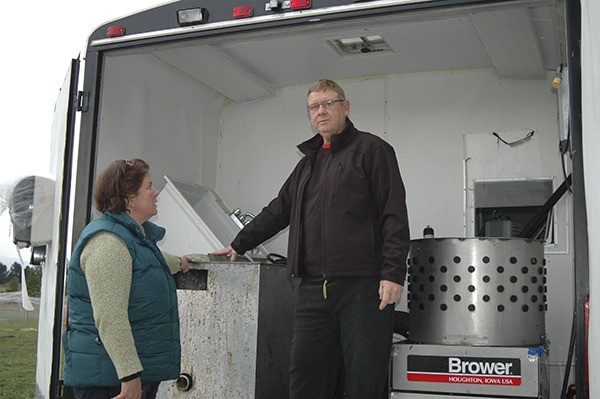Clark Farms
Where: 863 E. Anderson Road
More info: Call 681-5499 or e-mail clarkfarms@q.com
Setting the stage for other farmers within the greater Olympic Peninsula, owners of Clark Farms and fifth-generation Sequim farmer Tom Clark and his wife, Holly, received their Washington State Department of Agriculture (WSDA) food processor license.
The Clarks are the first farmers spanning from Port Angeles to Gig Harbor that belong to the Western Washington Poultry Farmers Cooperative to upgrade their state license which allows them to process rabbits and annually up to 20,000 birds using their mobile processing unit.
The unit is one of three mobile poultry processing units in the state, Stuart Boyle, cooperative president, said, and was purchased in late 2013 for $19,500 by a group of individuals Boyle rallied together to buy the unique processing facility on wheels. Although ranging in interests, the 26 individuals that pooled their funds together all shared a desire to provide local farmers with the ability to sell birds at farmers markets, grocery stores, frozen and specific cuts, Boyle said.
Without a WSDA processor license and certified processing facility, poultry farmers are restricted to selling fresh, whole birds directly to the end consumer from their farm within 48 hours of slaughter.
“It really was a grassroots thing and people put their money where their mouth is,” Boyle said.
Throughout the course of last year Boyle created a lease agreement between the growers (farmers) of the cooperative and those that purchased the unit, and collaborated with shared owners of the unit, such as the Clarks to learn how to use the unit, outfit it with state-mandated requirements and begin to write a user’s manual.
“It’s going to take a while to ramp up before getting birds to markets,” Boyle said. “But, the snowball is now rolling – we just need more snow.”
By last November, just in time for Thanksgiving, the mobile unit was ready and under their freshly acquired WSDA processor license, the Clarks processed 62 farm-fresh heritage turkeys and 90 pounds worth of rabbits.
“We are the first to be licensed with the unit,” Holly Clark said. “We spent the time getting it ready and the state and county wanted to make sure we were up to code. They are used to licensing permanent structures so we were a bit of a ‘square peg in a round hole.’”
Prior to the mobile unit, like many local farmers on the Olympic and Kitsap peninsulas, the Clarks were limited to transporting their poultry far distances to a certified processing facility such as one in Tacoma or Salmon Creek.
“You can raise pristine animals, but it’s only going to be as good as your processor,” Tom Clark said.
Because of the high costs, time, labor and stress to the animals associated with transporting at times two horse-trailer loads of chickens, the Clarks agree the mobile unit provides a much more “sustainable option.”
Raising cattle, poultry, pigs, rabbits and buffalo free from added hormones, antibiotics and steroids with a keen awareness of both the health of the animals and the environment, the Clarks have established a niche, Holly Clark said, and the mobile unit allows them to continue with that local, healthy and sustainable niche.
For small-farm hobbyists with fewer than 100 birds to process, the Clarks recommend using a kit that includes the necessary equipment such as a scalder, a picker/plucker and various sized cones and stand. However, for larger farms like Clark Farms that produce meat for retail in stores, markets and restaurants, the mobile unit is both cost and time efficient.
“I truly believe that the mobile unit is a means to an end for local farmers,” Boyle said.
Boyle hopes the mobile unit will allow Western Washington farmers the flexibility to try raising and processing poultry for retail without having to invest thousands of dollars into permanent certified processing facility first.
Thus, once farmers have the ability to expand via the mobile unit and if the interest and need persist, they can work toward a more localized, permanent facility, Boyle explained.
“We hope that going through the process of being licensed with the state will lay the groundwork for the rest of our members to move forward,” Holly Clark, said.
Looking ahead, the Clarks plan to continue to utilize the mobile unit to process poultry and increase their focus on rabbits. Historically, the Clarks raised hundreds of organic chickens for consumption, but raising chickens wasn’t sustainable once labor, cost of feed and lack of processing options were taken into consideration. With the mobile unit, however, the Clarks might raise chickens again.
Having “broken the ice” and successfully received their WSDA food processors license and with a certified mobile processing facility readily available, the Clarks are eager for additional cooperative members and farmers to follow their lead and further develop the area’s local meat market and availability.


